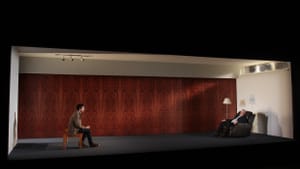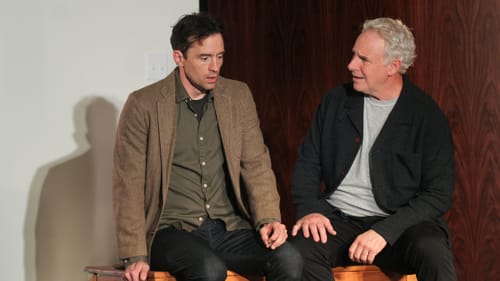Stay in the Loop
BSR publishes on a weekly schedule, with an email newsletter every Wednesday and Thursday morning. There’s no paywall, and subscribing is always free.
All my sons
People’s Light presents Caryl Churchill’s ‘A Number’

The legendary Caryl Churchill mixes playwriting and polemics in A Number, now onstage at People’s Light. Written shortly after the cloning of Dolly the sheep, the first mammal to be successfully replicated, the brief, thrilling work considers the moral and ethical implications of scientific advancement. If we entwine our sense of selfhood with the concept of a singular soul, where does that leave a being that may not have one?
Churchill avoids academic exercise—instead, she cleaves her drama to the parent/child relationship, that fraught bond so central to Western theater. Remove the vaguely sci-fi frame, and the story of Salter (John Dossett) and Bernard (Nathan Darrow) could be just another family play, seething with tension that bubbles up to the surface in short emotional outbursts. Director Eliza Baldi initially allows the situation to settle in a seemingly conventional way, before shocking the audience with the playwright’s scary pivot.
Father and sons
Because Salter and Bernard aren’t an ordinary father and son, of course. The Bernard we meet in the first scene—mild-mannered, trusting, generous—is actually a copy, an attempt by Salter to fix the mistakes that he and his depressed wife (who died by suicide) inflicted on their original little boy. Salter raised the replica while his real progeny rotted away in a group home, unaware of his semi-sibling but fully conscious of his father’s abandonment.
We’ll eventually meet him too, also in the body of the extraordinary Darrow, a carbon copy in form but divergent in every other possible way. (The woman sitting next to me couldn’t believe the same actor played both roles, and honestly, I can’t blame her.) The revelation also emerges that the doctors who reproduced the boy—clearly not the last word in medical ethics—made numerous versions now roaming the world, raised in other households under many different circumstances.
Nature vs nurture
Dossett excels at communicating Salter’s equivocating ambiguity—his inability to understand the levels of his benign cruelty is breathtaking. I shuddered when, in an unthinking moment, he referred to the clones as “things,” realizing too late that score included the child he loved. A different type of tautness infuses his interactions with Bernard 1 and Bernard 2, who find themselves careening toward a painful but inevitable outcome.
Questions of nature versus nurture burst forth, particularly in the wake of Darrow’s chilling transformation from the gentle Bernard 2 (as he’s called in the published script) to malevolent Bernard 1. If the actual child had been raised by his parent instead of institutionalized, might he also be kindhearted and affectionate, a productive member of society? What does it say that the clone feels more recognizably human to his father—and, by turns, to the audience—than the child he truly sired? Churchill offers no easy answers, and despite the play’s brevity (it spans less than an hour), she provides more to chew on than your typical jeremiad.

Unsettlingly recognizable
Even the intentionally elliptical can sometimes feel stifling, though, so it helps that Baldi, her actors, and a crack design team come together on the same page to create an unsettlingly recognizable world. Andrew Moerdyk’s brutally spare set, lighted with maximal abrasiveness by Amith Chandrashaker, primarily suggests the kind of average wood-paneled rec rooms found in many suburban homes. But as the proceedings ramp up, it takes on the loopy terror of a funhouse, its concave mirrors reflecting what its inhabitants don’t want to see. Looks can be deceiving, after all.
Costume designer Marla J. Jurglanis aids in individuating Darrow’s characters—the menacing Bernard 1 gets a leather jacket, natch—but the actor deserves all praise for the remarkable (and remarkably simple) ways in which he alters his mannerisms without ever coming close to schtick or winking spectacle. And whether he’s playing the tough guy or the tender boy, he shows you the soul the resides beneath Churchill’s occasionally terse dialogue. (Unlike Pinter, though, Churchill never confuses curtness for insight.)
Darrow returns in the final scene in one further form. It seems wrong to reveal the stakes of the coda, but needless to say, it reinforces Churchill’s commitment to theater as a vehicle for thoughtful and disturbing conservations about society. She leaves her audience with one final revelation to consider—and though this fine production also demands much, it’s similarly rich with rewards.
What, When, Where
A Number. By Caryl Churchill, directed by Eliza Baldi. Through June 9, 2019, at People’s Light’s Leonard C. Haas Stage, 39 Conestoga Road, Malvern, Pennsylvania. (610) 644-3500 or peopleslight.org.
All buildings on the People’s Light campus are ADA-compliant. Accessible parking spaces are available on site. Patrons can purchase wheelchair-accessible seating online or by calling (610) 644-3500. Complimentary companion seats are available for patrons who require a paid personal-care attendant.
All performances of A Number between Tuesday, June 4, and Sunday, June 9, will be open-captioned. There will be a relaxed performance on Friday, June 7, at 7:30pm.
Sign up for our newsletter
All of the week's new articles, all in one place. Sign up for the free weekly BSR newsletters, and don't miss a conversation.

 Cameron Kelsall
Cameron Kelsall